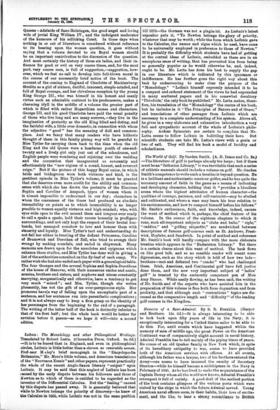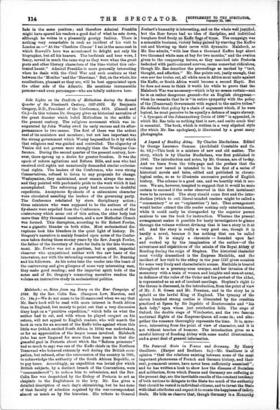Memoirs of a Rear-Admiral. By S. R. Franklin. (Harp2r and
Brothers. 12s. Gd.)—It is always interesting to be able to look back upon fifty years of life in the Navy; it is exceptionally interesting for a United States sailor to be able to do this. For, until events which have happened within the memory of men of middle age, the great Power on the American Continent was of comparatively slight account in naval history. Admiral Franklin has to tell mainly of the piping times of peace. He comes of an old Quaker family in New York which, in spite of its hereditary antipathy to war, seems to have provided both of the American services with officers. At all events, although his father was a lawyer, two of his brothers entered tilt Army—one seems to have incurred the enmity of Secretary Stanton—while he himself became a midshipman in the Navy in February of 1841. As he has lived ta make the acquaintance of the Captain Dewey whom all the world now knows, Admiral Franklin's retrospect is full of variety. A good deal of the earliest portion of the book contains glimpses of the various ports which were visited by the ships in which the future Admiral served. Young American naval officers seem, in their habits, their love of excite. ment, and the like, to bear a strong resemblance to British
lads in the same position ; and therefore Admiral Franklin might have spared his readers a good deal of what he sets down, although he writes in a pleasantly gossipy fashion. There is nothing very remarkable in such an incident of his visit to London as :—" At the ' Cheshire Cheese' I sat in the same seat in which Boswell's hero was accustomed to delight not only his biographer, but all his hearers. The beefsteak and beer were, I fancy, served in much the same way as they were when the great poets and other literary characters of the time visited this cele- brated haunt." Admiral Franklin is more generally interesting when he deals with the Civil War and such combats as that between the 'Monitor ' and the 'Merrimac.' But, on the whole, his recollections, pleasant as they are, will be best appreciated upon the other side of the Atlantic. He mentions innumerable persons—and even personages—who are totally unknown here.



















































 Previous page
Previous page